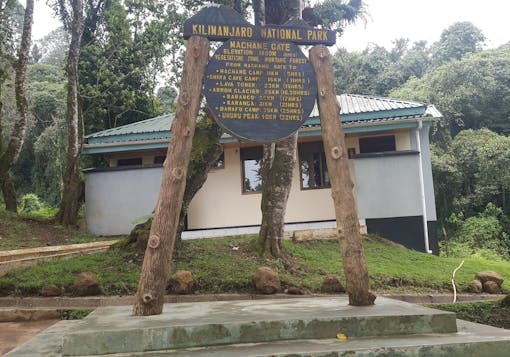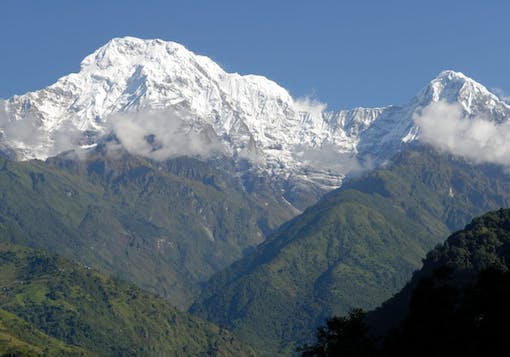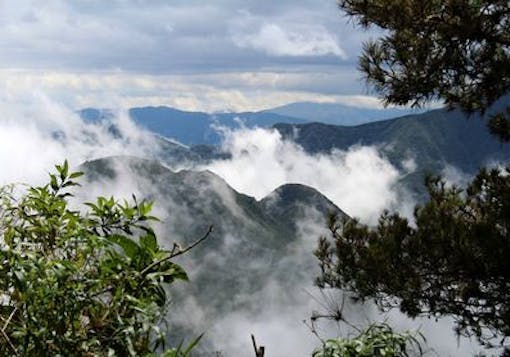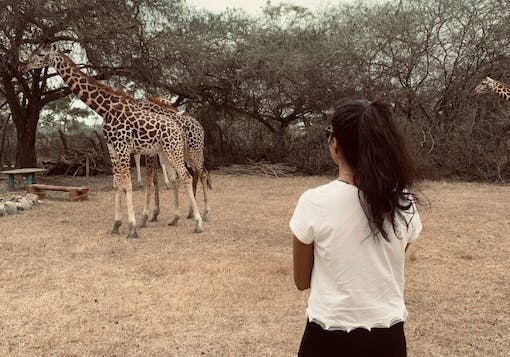Sustainable Travel in Developing Countries
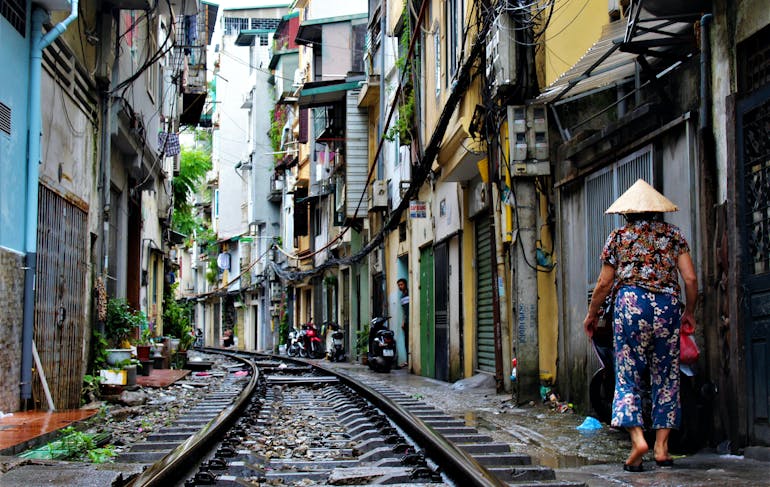
12
Feb
Sustainable Travel in Developing Countries
Whether you are new to traveling in developing parts of the world or have already trotted the globe once or twice, the below guide intends to serve as a resource to prepare you for sustainable travel in developing countries.
Before we dive in–what exactly qualifies an area as developing? Why should we direct our travel there? And how does this intersect with sustainability?
What is a developing country?
In reality, there is no simple answer. Even the WTO states that members who declare themselves as developing can have that claim challenged by other member states.
Although they agree there is no universal definition, WorldAtlas says:
Overall, developing countries tend to have significantly lower economic and social indicators than developed countries on average.
While classifying a nation as “developing” may be subjective, annual reports issued by the United Nations (UN) still offer a standard metric: in particular, the UN’s Human Development Index (HDI). According to the HDI, countries scoring less than .80 are classified as developing.
Based on the 2021 report, two-thirds of all countries are developing.
Why travel to a developing country?
There are many reasons why conscious travelers should opt for developing nations when considering where to go and spend their ‘tourist dollars.’ Tourist dollars refer to money spent on tourism by travelers at a particular destination. Tourist dollars help support:
- Tourism-Reliant Economies. This handy graphic from Visual Capitalist uses Gross Domestic Product (GDP) to illustrate which countries’ economies were most reliant on tourism in 2019. Naturally, when economic downturns cause tourism to drop, these economies are heavily impacted. The Covid pandemic is the most recent example of this.
- Younger Tourism Industries. A nation’s economy is one of the most important factors in its development. Traveling to developing areas can nourish less-established tourism industries, effectively contributing to their overall economic development.
- Education & Job Creation. A strong tourism industry creates jobs across hotels, restaurants, museums, national parks, travel agencies, tour operators, and more. Sustainable travel that supports local businesses and workers can, in turn, encourage education. Education, via traditional schooling and vocational programs, equips people with a range of requisite skills for the tourism industry.
- Infrastructure & Environmental Efforts. Tourist dollars provide indirect benefits, such as funding relevant infrastructure improvements that benefit locals, too. According to the Organisation of Economic Cooperation and Development (OECD), tourism taxes and revenue also support environmental protection efforts in crucially vulnerable areas.
With sustainable tourism having the potential to bring such a positive impact, and as economies continue to heal following the Covid pandemic, travel to developing countries is more important now than ever.
6 Things to Know Before Traveling to a Developing Country
With the “What” and the “Why” answered, the biggest question remains: “How”?
Newcomers to travel in developing parts of the world may still be nervous or uncertain–and that’s normal. Venturing into the unknown is uncomfortable. However, discomfort breeds growth into more conscious travelers, which must be embraced rather than avoided!
The below guide will help you learn what to expect and how to prepare for sustainable travel in developing countries by covering six topics:
- Culture Shock (& Reverse Culture Shock)
- Infrastructure (& How to Navigate It)
- Inequalities Amongst Travelers
- Being a Walking Wallet (Unwanted Attention, Tourist Scams & Negotiation)
- Wealth Inequality & Corruption
- Safety & Crime
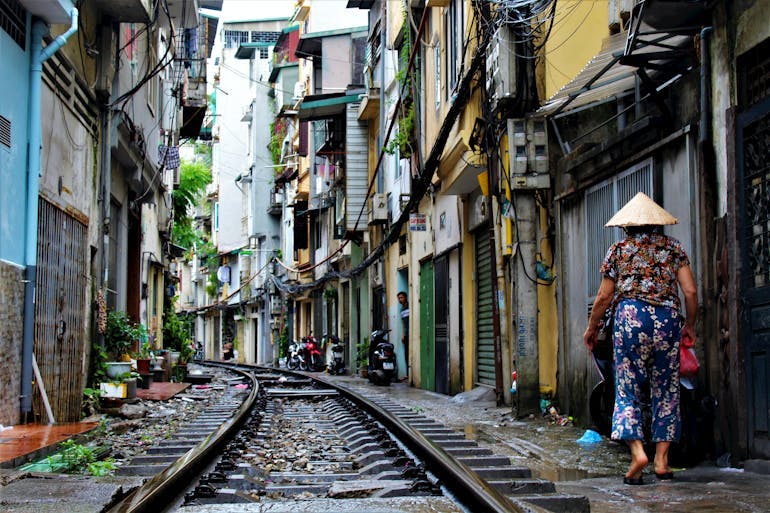
1. Culture Shock (& Reverse Culture Shock)
What to Expect:
The definition of “culture shock” refers to the emotional response or reaction to unfamiliar experiences in a new environment. An example of culture shock could be discovering that it is considered rude to tip in some cultures, even though it seems like a common practice in your home country.
Conversely, “reverse culture shock” occurs when returning and re-acclimating to your home environment, with the unfamiliarity coming from your changed perspective.
Despite the word “shock,” the phenomenon is rarely sudden or immediately evident. It is a normal and natural feeling that should not be cause for concern. More often than not, it is a simultaneous realization or awareness of the new culture we are in, as well as our own.
Importantly, culture shock can occur anywhere, even when traveling within your own native country. That said, it wouldn’t be unusual to experience culture shock when the perceived gap is more pronounced, such as between developed and developing nations.
How to Prepare:
Because unfamiliarity can trigger culture shock, there are two complementary approaches for how to deal with culture shock: education and perspective. Both contribute to managing expectations and feelings associated with the unknown.
- Education: Educating yourself before and during your travels will afford you a better sense of the many nuances of the destination and culture you are visiting.
- Perspective: Naturally, it is impossible to fully understand something as complex as the many facets of another culture. Here, the most simple advice is the most effective: keep an open mind and “expect the unexpected”.
Travel sustainably:
Preparing for culture shock is well-aligned with sustainable travel, and you may find culture shock to be more pronounced when visiting developing countries. Being a mindful traveler means being open to new experiences and not being dismayed or put off by differences. Be ready to learn how others do things differently than what you’re used to!
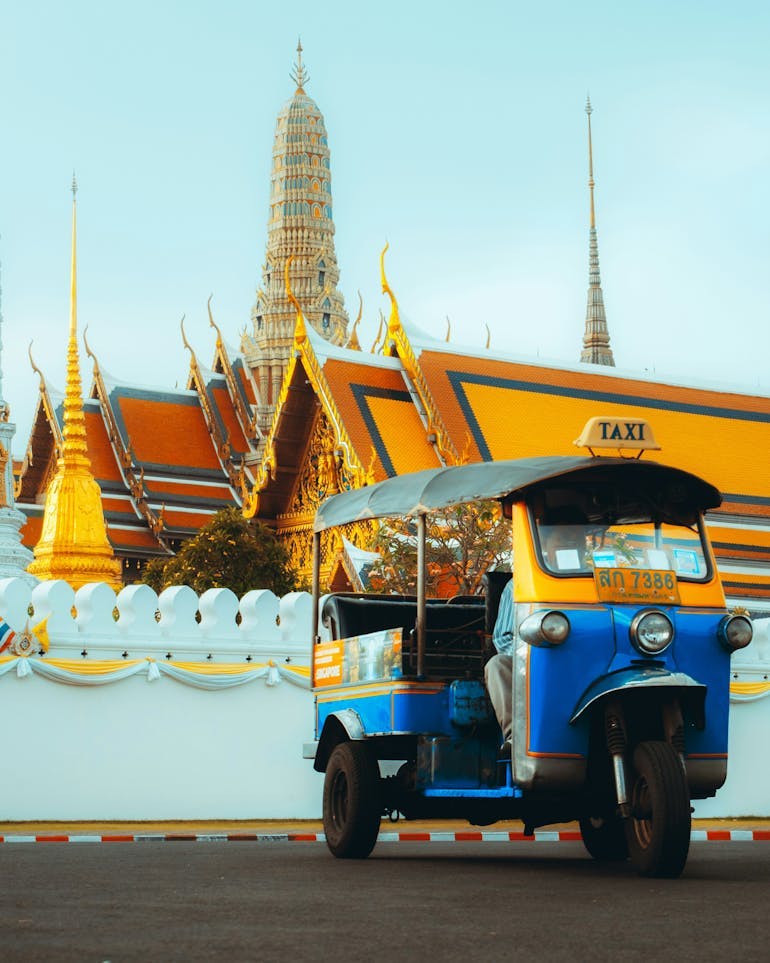
2. Infrastructure (& How to Navigate It)
What to Expect:
One of the most striking markers of being abroad is infrastructure. Travelers can feel and notice this immediately and constantly, all around them–in buildings, streets, and transportation.
In developing parts of the world, infrastructure will often be incredibly varied depending on where you are in the country. Some areas may be the same or even more extravagant than in developed nations, especially if related to commercial, hospitality, or military activities.
However, this is not usually representative of life for the vast majority of inhabitants. Residents may experience much less developed infrastructure in and outside of major cities.
For example, in terms of transport, you might notice:
- Unpaved or inconsistently maintained roads
- Less organized traffic
- More density on public transit
- Heightened pollution
- Different types of vehicles, such as scooters/motorbikes and tuk-tuks
You may see a difference in facilities as well, such as:
- Fans vs. air conditioning (in hot climates)
- Clothing lines vs. dryers
- Water hoses or bidets vs. toilet paper
- Squat toilets vs. traditional western toilets
- Trash cans vs. toilets (for disposing of toilet paper or feminine products)
How to Prepare:
When it comes to preparing for differences in infrastructure in daily life, we have two main pieces of advice to help you prepare:
- Research: As always, the first step should be thoroughly researching the specific places you intend to visit. Researching will inherently help you navigate the infrastructure and make appropriate preparations–from packing a roll of toilet paper to noting the transport options to your accommodation.
- Take cues from locals: Much of your learning will continue once you arrive by taking cues from locals. Consider something simple, like the task of crossing the street. In cities with heavily congested traffic, locals may not wait for traffic to stop but rather walk across at a consistent pace, allowing traffic to weave around them. Alternatively, some cities can fine you for crossing an empty street without a pedestrian signal. In both cases, use good judgment and proceed with caution!
Traveling sustainably:
Though options that appeal to our usual comforts are tempting, conscious travelers should make a sincere effort to try the local way. After all, we hope you travel in part to see and experience how others live! Plus, if you don’t “do as the locals do,” it could pose a higher sustainability risk, especially in developing countries (clogging a toilet because you didn’t put toilet paper in the trash can is not on anybody’s bucket list).
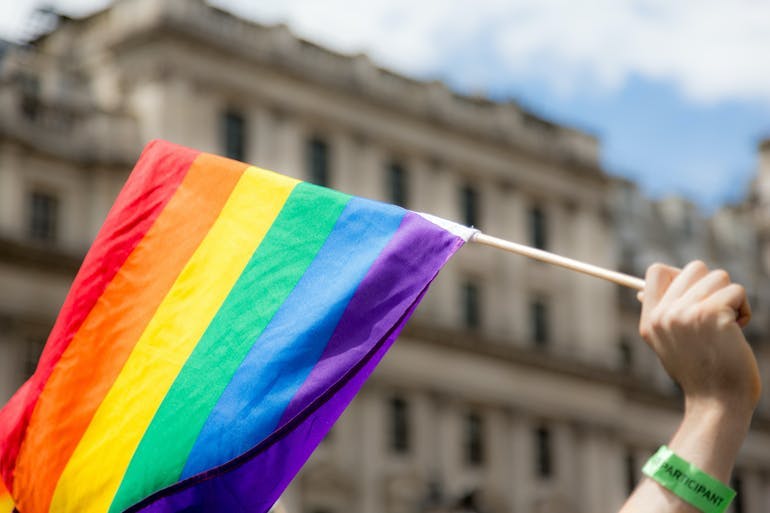
3. Inequalities Amongst Travelers
What to Expect:
In many developing countries, social politics typically are less progressive than in developed countries. Developing countries might exhibit less awareness of, or sensitivity to, race, religion, gender identity, and sexual orientation. Legislation and tolerance may also be lacking progress.
Less awareness may be uncomfortable to navigate but is not necessarily harmful. Particularly for less-touristic destinations, members of the local population may be curious to interact with foreigners. For physical differences especially, you might encounter:
- Staring
- Being asked to take pictures
- Having your picture taken without being asked
- People attempting to touch you (your hair, for example)
Where tolerance is lower, tourists should be especially prudent. Locals mostly will not expect foreigners to adhere to their social norms, but not always. Generally, this shouldn’t prevent travelers from visiting a particular nation, but they may employ certain precautions to navigate the country more comfortably.
How to Prepare:
Preparation for this will be very individual, personal, and even emotional. Here are some helpful tips:
- Decide on boundaries. Consider early on what boundaries you want to maintain, where appropriate, such as whether or not you are OK with having photos taken of you.
- Choose what to share. You can also decide what information you may or may not feel comfortable disclosing about yourself. Having a plan in this sense can help you feel more secure if you ever encounter a challenging situation.
- Be patient. Travelers should also expect to practice patience and, perhaps ironically/unfairly, tolerance. It can be incredibly challenging to be treated differently than in your home country or even to witness it.
- Think carefully about challenging the status quo. It may be tempting to try to challenge the status quo. While safe opportunities for open dialogue are encouraged, visitors should remain conscientious about not imposing their views. Balancing this may create some cognitive dissonance, but we must accept this reality.
We know social injustices sadly transcend all cultures. Thus, traveling can remind us of the battles we still must face in our home countries.
Traveling sustainably:
Part of being a sustainable traveler, whether you’re in a developing country or not, is remembering that you are a guest in somebody else’s home. You do not make the rules, but you are responsible for following them. Doing so is the most respectful – and also the safest – thing to do.
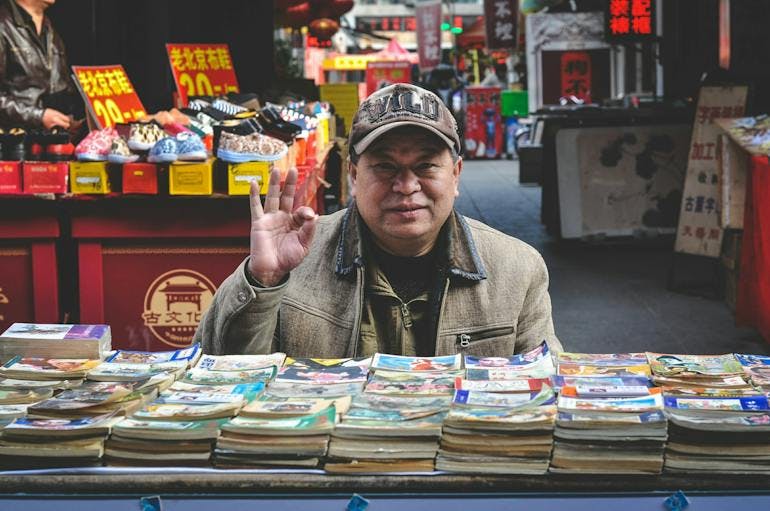
4. Being a Walking Wallet (Unwanted Attention, Tourist Scams, & Negotiation)
What to Expect:
Tourists tend to stick out like a sore thumb. They are known to spend money and are thus persistently approached by sellers of goods and services. Being constantly solicited can feel overwhelming, exhausting, and frustrating, even more so if it detracts from simple pleasures like strolling through a city or relaxing on a beach.
Intense negotiation cultures and the threat of tourist scams add an extra layer of emotional labor to these experiences. In both cases, tourists are vulnerable to information asymmetry, where they don’t know the fair price of a good or service. Over time, these can leave feelings of distrust.
Although tourists are generally prepared to spend and happy to support locals, no one likes feeling taken advantage of or coerced into a purchase. Especially with frequent expenditures like food and transportation, determining how to navigate these purchases and how much you should be paying makes a huge difference.
How to Prepare:
Knowledge is the best way to combat information asymmetry. Here are two easy things you can do:
- Ask somebody. The prices of goods and services are always subject to change. Consult other travelers, locals, or the host of your accommodation for the latest rates.
- Visualize a negotiation. For those newer to negotiation, visualizing and practicing the negotiation in advance can also be helpful.
Be sure to learn about common travel scams and negotiable situations in your destination before you travel, too. Some examples include:
- Taxis: Drivers may avoid using the meter, use tampered meters, or take longer routes to drive up the price, so always confirm the meter is on and working before driving off.
- Tipping: Know how much to tip and which services warrant them. In some places, tipping is expected for the smallest of acts, while in others, it is considered rude.
Overall, it usually doesn’t hurt to try to negotiate a price. In some tourist hot spots, even prices printed on a menu might be inflated and open for negotiation, so you never know!
Finally, tourists can encounter a hidden “tourist tax”–or a price higher than locals pay. Still, prices are generally very reasonable compared to more developed countries, so even an inflated rate may be one you are happily willing to pay.
Traveling sustainably:
A huge benefit to local communities you travel to is that you inject money into their economy. Understanding the nuances we’ve discussed will help you help locals without feeling taken advantage of. Sustainable travel in developing countries includes paying a price that is fair to the seller – and it should feel fair to you, too.
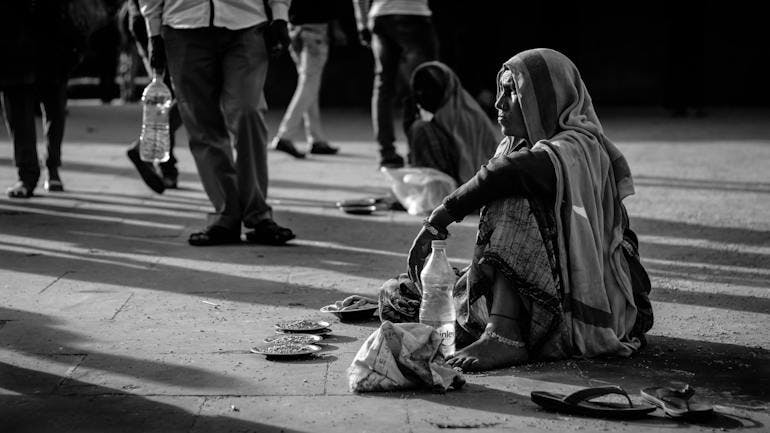
5. Wealthy Inequality & Corruption
What to Expect:
Wealth inequality is not always a marker of development. For example, the United States has a higher wealth gap than many developing countries due to just how wealthy the wealthy are. World Population Review offers easy-to-understand explanations and visuals of wealth inequality using data from the World Bank and CIA, though not all available data is up-to-date.
As with all things, significant wealth gaps look different everywhere. Contrary to the US, many developing nations’ wealth gaps are driven by just how poor the poorer are. In developing countries, you can see these two scenarios existing alongside each other:
- Incredibly luxurious lifestyles consisting of marble homes and personal drivers, even for the middle class
- Extreme poverty, marked by poor living conditions, higher rates of homelessness, and begging, even from children
Corruption, often in some form of a bribe, tends to go hand in hand with wealth inequality. Tourists will seldom encounter demands for bribes, but in the extremely rare cases where they do, it would most likely be with the police. Here’s a quick overview of how this might look:
- Scenario: Being stopped by police, even if no law has been broken. For example, Bali’s notorious police checkpoints seem to exist solely to take bribes from tourists and locals.
- Logic: Bribes function similarly to a ticket/fine, with a more favorable outcome for both parties–paying a lower price than the actual ticket or fine while the officer keeps the money.
- Rules: Similarly to goods or services, there is often a “fair” market price, which will likely differ for locals and tourists. Negotiation may be expected to arrive at this price.
- Signs: In reality, being asked for a bribe can feel so mundane that you may not even notice! Telltale signs of being asked for a bribe include not receiving any paperwork and paying the officer directly on the spot vs. at an official courthouse.
How to Prepare:
Witnessing displays of wealth disparity up close may be jarring or upsetting. Here’s how you can prepare yourself:
- Anticipate. Travelers should anticipate the emotional response seeing wealth disparity may elicit. This anticipation will help with culture shock, too.
- Consider taking action. If you think this may inspire you to take action, this forethought allows you to better prepare in advance. Our blog post, 4 Harmful Travel Mistakes To Avoid, offers a helpful overview of the right and wrong ways to make an impact.
Regarding bribes, you should make a point of confirming the prevalence in your destination in your research, though once again, encountering these is extremely rare. Given the inherent legal implications, we cannot make direct recommendations. Instead, speak with the host of your accommodation and locals to make informed decisions at your own discretion.
Traveling sustainably:
Travel won’t always be comfortable or pretty. Being confronted with situations that pull at your heartstrings is part of what makes travel so important. Sustainable travel in developing countries (and developed countries!) is about understanding, respecting, and appreciating other people and cultures. If you feel encouraged to be more empathetic, kind, or to take impactful action, then you’re reaping one of the most important benefits of travel.
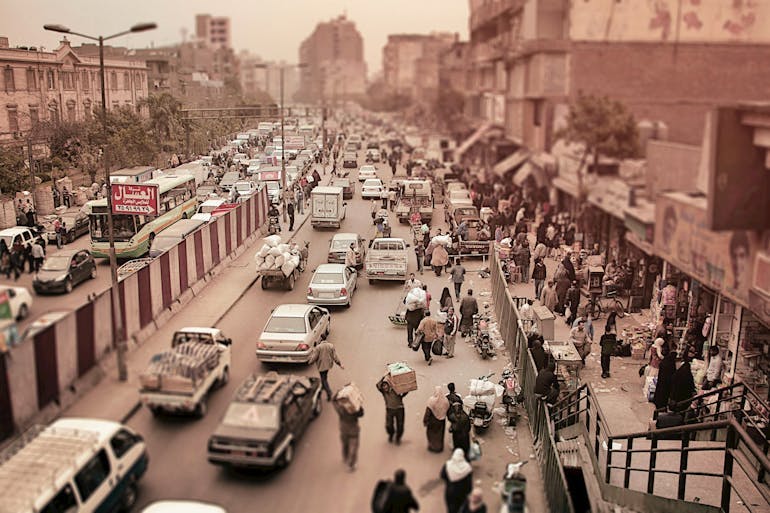
6. Safety & Crime
What to Expect:
Safety and crime occur everywhere. The type and prevalence of crimes will always vary by destination, but safety typically is not as high a threat as many might assume. Generally, being scammed, ripped off, or pick-pocketed are the most common offenses you will encounter anywhere. While frustrating and violating, violence generally isn’t involved.
Instead, the most common safety issues are often unrelated to crime, for example:
- Traffic: In addition to unorganized and congested traffic, tourists may face unfamiliar traffic rules and signage in a foreign language. It is important to keep this in mind if you choose to rent a car, scooter, or bike, and even as a pedestrian.
- Liability: Developing areas may be less concerned with liability overall. For example, motorbikes can be rented to people without prior experience or a driver’s license. This has notoriously led to accidents where travelers can get seriously physically hurt.
- Food & Water: Some areas lack potable water or handle food in ways that can allow it to become easily contaminated. Possible forms of exposure include consuming ice, a salad rinsed with tap water, or food that may have been sitting out for an extended time.
How to Prepare:
Before taking part in any risky activities, we urge you to do the following:
- Always personally assume responsibility for ensuring your comfort and safety
- Thoroughly research providers
- Ask questions if you ever feel unsafe or unsure
- Err on the side of caution
- Have travel insurance
As always, try to get a sense in advance of situations that may be unique to your destination. For example:
- In Brazil, if you have your phone out while walking on the sidewalk, it could be easily grabbed by passing scooters.
- In Thailand, solo men may be targeted by women for money or valuables.
Generally speaking, use the same judgment as you would at home or in any foreign country, but additional suggestions are as follows:
- Bring your own lock to secure valuables
- Avoid having too much cash, or unnecessary valuables, on your person or in your room
- Be vigilant regarding your purse, wallet, or phone, keeping them discreet, close to your body, with an arm/hand over the top, even while dining
- Ask your accommodation about potentially unsafe areas, streets, or neighborhoods
- Eat only freshly cooked food and ask if potable water was used in your meal, in doubt
- Ensure your accommodation and contacts know your itinerary and how to reach you
- Check government travel advisories and register your trip with your government
Traveling sustainably:
We don’t want you to feel unsafe traveling. We also don’t want misconceptions about safety, or lack of preparedness, to prevent you from seeing incredible, off-the-beaten-path destinations. Learn how to travel with safety in mind so you can have great experiences, and then encourage your friends to give traveling in developing countries a try. The local community and economy will thank you!
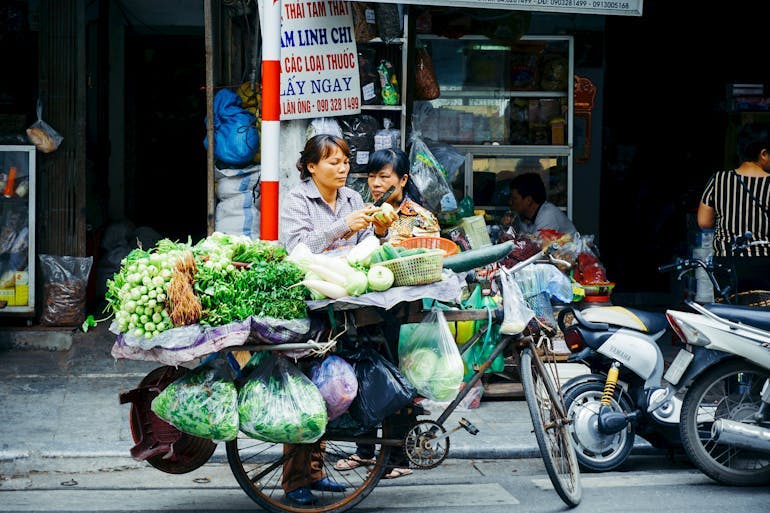
Takeaways About Sustainable Travel in Developing Countries
We won’t pretend that many of the above points don’t raise an eyebrow or two (or three!).
However, as we now know:
The single best thing you can do to mitigate culture shock is to know what to expect.
In compiling this candid guide, we hope to have provided a fair and accurate portrayal of travel in the developing world and remind you once again that many points are universal.
As we’ve also learned by now, much of the world’s population lives in developing countries, making citizens of developed countries the outliers. While it may be easier to notice our differences when abroad, it is helpful to focus instead on what we have in common. Commuting to work, spending time with loved ones, cooking dinner, doing laundry–at the end of the day, we can all relate to the mundane nature of day-to-day life.
Ultimately, traveling should be exciting, fun, and joyous! It should also help us challenge our perspective and educate ourselves into more mindful individuals. So remember to embrace the differences, welcome the changes they may bring to our views and practices, and channel that into positive impact–for the world and ourselves.
Further reading on developing countries and inequality:
- The UN’s list of developing countries includes in-depth reports on the 46 countries currently holding the lowest HDI scores.
- This UN World Economic Situation and Prospects (WESP) report from 2014 offers a clear example of how nations can be categorized with even more nuance.
- Inequality.org focuses on various inequalities within the US, but their Global Inequality coverage addresses global wealth and income with links to additional helpful resources.
- World Inequality Database is an easy-to-navigate resource for looking at inequalities on a global or country level. Be sure to also check out their 2022 World Inequality Report.
